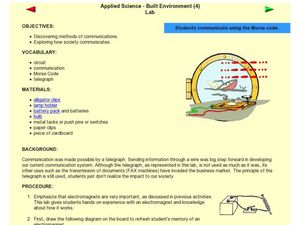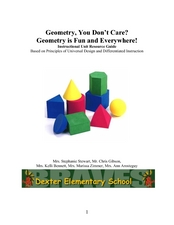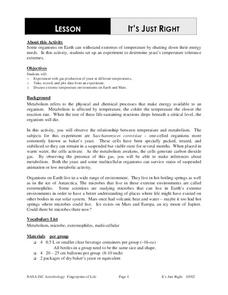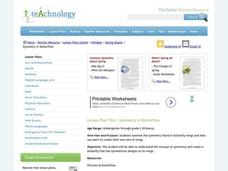Curated OER
Communication Methods
Students explore communications by participating in a science class activity. In this communication technology instructional activity, students discuss the process of morse code, its history, and the electromagnets used to create the...
Curated OER
Applied Science - Built Environment (6) Lab
Sixth graders look at toys in space. In this gravity lesson, 6th graders make predictions about what different toys will do with zero gravity. They watch a space video and see what happens to these toys in space.
Curated OER
Geometry is Fun and EverywhereGeometry, You Don’t Care? Geometry is Fun and Everywhere
Third graders investigate shapes in our world. In this geometry lesson, 3rd graders describe plane and solid shapes and identify angles, solid objects and lines of symmetry. Students use online resources, graphic organizers and conduct...
Curated OER
Our Desert Backyard
Students make observations of their own backyard. In this environment lesson, students keep records of the plants and animals they see in their home or school yard. Students make notes of how the weather and environment changes over...
Curated OER
Native American Three Sisters Gardens
Learners investigate companion planting. In this communtiy gardening activity students explore the tradition of the Native American Three Sisters gardening approach. Learners act as botanists, anthropologists, folklorists, and...
Curated OER
Energizing Resources
Seventh graders describe electrical energy and how it is produced. In this natural resource lesson, 7th graders explain the various ways of obtaining and using natural resources for energy and the environmental consequences. They will...
Curated OER
Does Dye Die? Foreign Chemicals in Our Environment
Students conduct an experiment to observe photolysis in the lab. In this chemistry lesson, students explain the mechanism behind photolysis. They test the impact of a non-toxic marker to plant metabolism.
Curated OER
It's Just Right
Students conduct an experiment to determine the temperature tolerance of yeasts. In this biology lesson, students collect data and compare them by plotting graphs. They explain how extreme temperatures affect organisms.
Curated OER
The Wonders of Bacteria
Students explore the evolution and features of bacteria through a series of activities. In this biology instructional activity, students collect data and graph bacterial growth. They design a brochure about bacteria's role in society.
Curated OER
Profess the Compress
Students determine the ground clearance of CEENBoTs by adding weights. In this physics lesson, students explore the compression and extension of different springs. They cite real world applications of Hooke's Law.
Curated OER
Emergency Preparedness
Students take a closer look at emergency preparedness plans. In this writing skills lesson, students evaluate the severe weather, natural disaster, and threat plans in place at their school and then write their own improved emergency...
Curated OER
Simple Machines IV - Wheels and Axles
Fourth graders study everyday examples of simple machines. They examine how the combination of a wheel and axle works more efficiently than either in isolation. In a demonstration lesson, they see how a spring scale shows a force pulling...
Curated OER
Simple Machines III - Pulleys
Fourth graders are introduced to a spring scale to show that the forces on both sides of the pulley are the same. They break into groups to lift objects with fixed pulleys and with multiple looped pulleys and then measure the force...
Curated OER
Symmetry in Butterflies
Students design butterflies. In this symmetry lesson, students examine butterfly pictures, discuss the symmetry of their wings, and create their own symmetry patterns.
Curated OER
Who Has the Power?
Fifth graders write persuasive letters expressing opinions about the purchase of 25 acres adjacent to Wakulla Springs proposed to include a convenience store/gas station. They submit the letter to the Florida Department of Environmental...
Curated OER
Stand Up Bunny
Students create "stand-up bunnies" for classroom display in this early-elementary Art lesson ideal for the spring months. A bunny template and design ideas are included to aid in the teaching process of this fun and quick lesson.
Curated OER
Sold! Ageless Water
Young scholars read "Tuck Everlasting" by Natalie Babbitt. They create an advertisement for the spring water described in the story.
Curated OER
Smiling Flowers Bulletin Board
Students create paper plate flowers using basic art supplies, digital pictures of themselves, and "stems and leaves" in this Art-based lesson that incorporates digital technology. The lesson is ideal for use during the spring months.
Curated OER
Understanding Seasons
Students study the four different seasons: fall, winter, spring, and summer. They match the seasons with pictures that relate to them developing an understanding of the differences. They then complete the worksheet about the seasons.
Curated OER
What's the Rub? It's All About Friction!
Students determine the coefficient of friction for different surfaces. In this physics lesson, students identify the factors that affect friction. They collect data and write a formal lab report.
Curated OER
Tie Dye Eggs
Young scholars create "tie-dye" easter eggs in this easy elementary school lesson plan. Materials needed include paper towels, food coloring, eggs, and rubber gloves. This Easter lesson plan can be accomplished in 30 minutes with extra...
Curated OER
Sum of Angles on a Triangle
Use this lesson for a basic review of angles. While the activities discussed are outlined, there are no materials provided to make implementation possible. When using this resource, it is necessary to create worksheets and other...
Curated OER
Egg-sceptional
Students design colored Easter eggs in this simple Art lesson for the elementary classroom. The dye is created using almost boiling water and should be done by the teacher. This lesson is ideal for the spring-time months and includes...
Curated OER
Which Came First-Democracy or Growth?
Students investigate economic growth and standard of living. In this economics lesson plan, students investigate the GDP per capita and how it affects the economy. Students differentiate nominal and real GDP.
Other popular searches
- Spring Art Lessons Primary
- Spring Lessons Kindergarten
- Science Spring Lessons
- Esl Lessons Science Spring
- Multicultural Spring Lessons
- Art Lessons Spring
- Art Spring Time Lessons

























